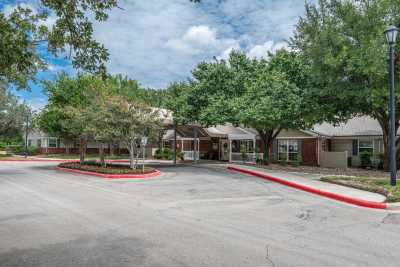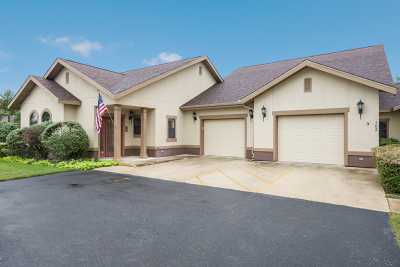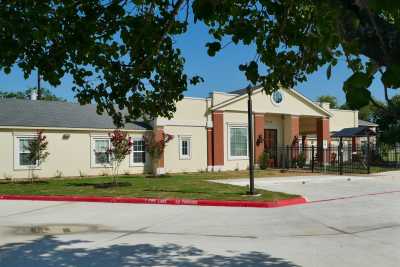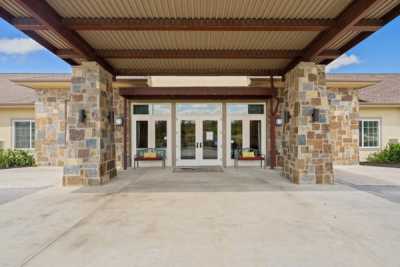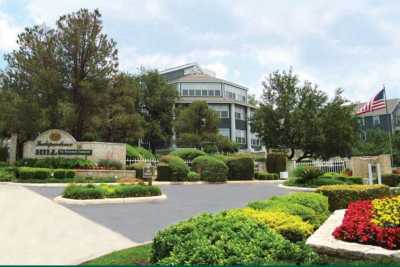
10 Best Memory Care Facilities in San Antonio, TX for 2023
In recent years, San Antonio has risen to the top ranks of retirement destinations. Due to the city’s year-round sunshine, affordable living, and robust senior living options, more families and seniors are choosing San Antonio to settle. A Place for Mom partners with 27 memory care facilities in San Antonio, making it a desirable option for seniors with dementia, as the variety of local communities enables them to be as choosy as they’d like.
Memory care communities offer a personalized senior living option for seniors with dementia. With intentional design features, person-centered care services, and specialized memory care programming, these communities are equipped to care for seniors in early and late stages of dementia. On top of robust memory care services, these facilities also offer assisted living care services, like assistance with activities of daily living, medication management, dining plans, and more.
In this guide, you’ll find robust, hyperlocal data on memory care costs, payment tips, Texas memory care regulations, senior-specific stats, senior resources, and dementia-friendly activities to help you narrow down your memory care options. You’ll also be able to categorize communities by what matters most to you and your loved one.
San Antonio Memory Care Facilities | 1695 Reviews
I began a journey to find the right facility for my 109 year old GOD-Aunt; not due to convenience but out of necessity. We literally ran out of money for 24 hour around the clock care. Thankfully, my...
They are a very well trained organization. They get stuff done as soon as possible. Super friendly. On top of the staff and training for the employees. The caregivers are very sweet and super attentive.
My great uncle was a resident at Brookdale Nacogdoches for a many years and was always in good hands with their staff. As a veteran, he was ALWAYS treated with dignity and respect and even had his photo...
Arden Courts A ProMedica Memory Care Community in San Antonio
15290 Huebner Rd., San Antonio, TX 78231Arden Courts in San Antonio, TX has been a lifesaver! My mother has been living with my husband and I for one year. Being a caregiver to a person with Dementia has been the most challenging task I have ever...
1. Overall experience-GREAT!! The director, [name removed] is an absolute angel! The day I met her, she had come in on a weekend just to check on the residents to play bingo with them on her day off. And...
Every time I visit the community my aunt looks happy. She seems to love the staff and the staff love her. We love to see that she is content. It makes us feel good knowing she is in such a great place.
1. Consistently delicious food 2. Wonderful activity offerings, something for everyone 3. Daily Catholic mass 4. Very friendly residents, it seems like they all know each by name! 5. Transportation...
We have been very satisfied with the experience at The Haven and The Laurels in Stone Oak! The staff has been very caring and supportive. Highly recommend this facility to others.
It appears that the Forum Independent Living is having a facility staffing issue as they have a large sign in front of the facility noting a hiring need.
A loving and warm atmosphere is the most important thing that we looked for when we’re were making such a difficult decision to place our loved one. After our visit and conversation with the administration...
Our free advisors can help
- Compare local facilities
- Determine care type
- Schedule tours
- Evaluate pricing
What we really like about The Westmark Senior Living is that they really make our loved one feel at home and we would recommend them to other families who may need a place for their loved ones
This place truly feels like home. The location is great and is near my daughter and my sister. I would highly recommend this amazing assisted living facility.
My wife and I moved to this Brookdale Community about four months ago. We sold our home and down sized to a smaller rental home a couple of years ago. It was difficult providing care for my wife. While at...
Having to put your Mom or Dad in a place to be cared for is always a difficult situation. We have been in a few facilities before Aventine at The Etta and I have to say this place is far above our past...
The people who work at Poets Walk seem to genuinely care about the wellbeing of the patients. I knew that my Dad was in good hands. They alerted me promptly about anything I needed to know, anything my...
My father-in-law is very settled and happy there. The new ownership and remodeling has caused a little bit of an upheaval, but the company has been very professional and considerate of the residents through...
My experience has been really good so far so I would highly recommend it. [name removed] is amazing!!Much better experience than my previous place
Every caregiver is extremely kind and compassionate. As my mother-in-law's needs have changed, they have embraced it and worked with us making sure she receives the increased care she needs now.
Although it is a 50 and above community, there are mostly 70 and up residents. That worked out well for my dad- to have similar age people there mostly. One complaint I have is the food service -or lack of-...
We felt like they honestly cared about our needs. When my brother arrived he was treated as if he was a family member. The residents introduced them self will instruction of what to do and where to go, and...
Sometimes, the maid skimps on cleaning the shower. Many times, eggs, bacon, sausage, or Canadian bacon not included for breakfast. Only protein served is yogurt. There were supposed to be movie nights once a...
Everything generally is good regarding the care. They do not communicate very well regarding her condition and never told me she had Covid recently. I had to hear that from her hospice nurse after the fact....
What we really like about Shavano Park is the size of the rooms, they were larger than the other ones we looked at. We would recommend this community to other families who may need a place for their loved...
As you know my Wife was diagnosed, by the VA with dementia. I moved into assisted living to be with her Once I moved in it was determined that she passed all the dementia testing and no longer needed to be...
I feel like I can give most of those ratings only because I am constantly managing issues. I have to regularly bring things to the attention of staff because my mother-in-law won't or can't advocate for...
Our methodology
How we rank order the San Antonio community options above
We developed a proprietary recommendation system that orders San Antonio community options based on factors we know are important to seniors and their families:
- Proximity to your search location
- Availability of recent, high-quality reviews
- The amount of detailed community information available
Where we source our information
14,000+ communities
We collect proprietary data from our network of 14,000+ senior living communities in the U.S., with regular refreshes of data and information
350,000+ reviews
We have 387,000+ reviews from senior living residents and family members that provide first-hand accounts about senior living communities
- Costs of memory care in the San Antonio area
- What families are saying about memory care in San Antonio
- How people pay for memory care in San Antonio
- Understand Texas laws and regulations for memory care facilities
- San Antonio: A city dedicated to dementia-friendly initiatives
- San Antonio memory care services and amenities
- Explore senior care with confidence
- Unfamiliar with San Antonio? Highlights for seniors
Costs of memory care in the San Antonio area
The median rent cost, not including additional fees for care and amenities, is $4,548 per month at partner San Antonio memory care communities, according to A Place for Mom’s 2022-2023 proprietary data.[01]
Although this cost may seem steep at first, you’ll find that memory care costs include much more than rent. In fact, most San Antonio memory care facilities include tailored personal care services, activities, and amenities in their monthly cost. Families can expect the following from San Antonio memory care communities:
- Personal care services
- Person-centered memory care therapies (like redirection and validation)
- Cognitively stimulating activities
- Transportation services
- Three meals per day and snacks
- Person-centered activities and exercise (like reminiscence therapy or yoga)
- Shared indoor and outdoor common areas (like enclosed courtyards, gardens, libraries, game rooms, etc.)
- Round-the-clock supervision and security
Below, you’ll find average baseline costs for San Antonio memory care facilities that don’t account for any service add-ons or fees. Though they are baseline costs, these figures can help you compare costs of the area.
Average monthly cost of Memory Care in San Antonio, TX vs. nearby cities
Average monthly cost of Memory Care in San Antonio, TX vs. the state and national average
Average monthly cost of Memory Care in San Antonio vs. other types of senior living
Median monthly costs of Memory Care in San Antonio, TX by room type
What families are saying about memory care in San Antonio
Recent reviews for memory care in San Antonio
Sodalis Stone Oak in San Antonio, TX
Heritage Creek Assisted Living in San Antonio, TX
Pecan View Senior Care AL in San Antonio, TX
Reviews mention these favorite features of communities
San Antonio review score based on 480 family reviews
This proprietary review score is based on 480 reviews of 74 San Antonio memory care communities. All reviews were submitted in the past two years by verified community residents and family members.San Antonio review score compared against nearby cities
Review subcategories for San Antonio memory care
When memory care residents and family members submit a review on our site, they rate each community on categories such as cleanliness, activities, meals, and more. The chart below is based on 480 reviews of 74 San Antonio memory care communities. This chart helps you compare San Antonio resident and family memory care satisfaction rates against national averages. Use it to assess your needs and develop criteria for your own search. If you know that one of these categories is important to you or your loved one, our senior living advisors can help you find communities to match your needs.How people pay for memory care in San Antonio
There are many options to pay for memory care in San Antonio. Families typically turn to private income sources and insurance policies first, as well as Social Security and pension income. They may also use federal and state programs, such as VA health care, Medicaid, and Medicare, to help offset some medical and memory care costs. This section includes a breakdown of the most common payment methods used by families.
Private pay methods include your loved one’s personal income sources — savings accounts, Social Security benefits, retirement pensions, and investment returns. These can all be used to defray some memory care costs along with the following:
- Selling a house. If your senior loved one is moving to a memory care facility, it may be time to sell their house. Freed-up cash from the sale may be used to cover memory care costs.
- Reverse mortgage. If selling a house isn’t feasible, a reverse mortgage might be a better option. It’ll enable your senior loved one to borrow a loan from their home’s equity to fund costs for a memory care facility.
- Health savings accounts. Your senior loved one might’ve been enrolled in a health savings account (or HSA) program through their employer. If so, they can use those funds to cover several qualifying medical expenses, including memory care.
- Life insurance. If your loved one has a life insurance policy, they could sell it, surrender it, or borrow from it. These options can free up some extra cash to help cover memory care costs. However, you’ll need to check with the policy provider to learn about what’s possible.
- Long-term care insurance. Long-term care insurance policies can be used to cover some of your senior loved one’s memory care services. These policies typically vary in what they can cover, so it’s recommended that you consult with your loved one’s policy provider to learn about what’s covered.
With many military bases and job opportunities for veterans throughout San Antonio, it has become the city with the highest veteran population in Texas. This large vet population has resulted in a citywide effort to enhance the lives of veterans.
Veterans pension and the Aid and Attendance benefit
Veterans who receive a veterans pension from the U.S. Department of Veterans Affairs (or VA) and are enrolled in VA health care may also qualify for additional disability benefits to help pay for memory care costs. The Aid and Attendance benefit is the most useful benefit as it can be added to your veterans pension to pay for anything that improves a senior veteran’s quality of life, which could include memory care.
The approval process for VA benefits is often long and difficult, and there are several different types of VA Aid and Attendance benefits. So before you begin the application process, best practice is to reach out to local veteran resource centers to make sure you don’t get denied. If you are at first denied, don’t get discouraged, as local veterans benefits advocates can help you appeal the claim.
San Antonio veteran resource centers
San Antonio offers over 200 veteran programs and support services to help veterans and their families understand their benefits and apply for them. This can become overwhelming to navigate and is precisely why the Texas Veterans Network (TVN) — San Antonio exists. The TVN assists veterans and families with the strenuous application process. TVN employs staff members who evaluate your veteran loved one’s unique situation to recommend the most relevant and helpful programs. The TVN staff will even continue communicating with recommended organizations to confirm that solutions work for your family.
Some of the most popular veteran assistance organizations are scattered throughout the state and city. Below, you’ll find a list of veterans services offices and online resources that help veterans apply for benefits or appeal claim decisions. You’ll also find veteran disability-benefit advocacy services through your local Disabled American Veterans (or DAV) chapter.
Resources for San Antonio veterans
Military and Veteran Affairs Department home page
100 W. Houston St., Suite 1008
San Antonio, TX 78205
Phone: 210-207-3995
Military and Veterans Services Center (MVSC) home page
1422 E. Grayson St., 4th Floor
San Antonio, TX 78208
Phone: 210-335-6775
Email: vets@bexar.org
Hours: Monday through Friday, 8 a.m. – 12 p.m., 1 p.m. – 5 p.m.
Alamo Area Council on Governments (AACOG) veteran services
Phone: 888-724-8387
Email: txveteransnetwork@aacog.com
North West San Antonio VA Clinic
9939 State Highway 151
San Antonio, TX 78251
Phone: 210-706-7800
Hours: Monday through Friday, 6 a.m. – 5:30 p.m.
Medicaid is a joint federal and state health insurance program that provides coverage to people with limited income and resources. Texas has its own Medicaid program called STAR, operated by the Texas Health and Human Services Commission (or the HHSC). In addition to Medicaid, the HHSC contracts with local area agencies on aging (or AAAs) programs. These programs offer long-term care services and disability programs to help seniors 60+, low-income seniors, and seniors with a disability receive Medicaid benefits.
STAR+PLUS Medicaid program
In Texas, most seniors who qualify for Medicaid get their coverage through STAR+PLUS — the state’s managed care program for seniors 65+ and individuals with disabilities. In addition to routine health care costs, the STAR+PLUS program covers long-term care services. These include nursing, personal care, therapy extension, nutrition, and transportation services. However, these health and long-term care services are only covered through agencies licensed and certified by the Texas Health and Human Services Commission.
Home and Community Based Services (or HCBS) waiver programs
A senior can receive medically necessary home health care services through STAR within a residence of their choice. To do so, they must qualify for a Home and Community Based Services (or HCBS) waiver program. This waiver can be used anywhere a senior calls home, meaning it can be used in a memory care community, as long as the care agency providing the care services is contracted with the senior’s STAR managed care provider. These waiver programs enable seniors to receive care within the residential setting of their choice, as opposed to an institutional setting commonly found in nursing facilities.[03]
Requirements for Home and Community Based Services (HCBS) settings
Most stand-alone memory care facilities typically don’t qualify as an HCBS setting; however, some memory care group homes and assisted living facilities with a memory care unit will. Be sure to check with each prospective community if you plan to use Medicaid to pay for care services through them. To qualify as an HCBS setting, facilities must meet the following requirements:
- Be integrated into a greater community
- Provide opportunities for interested residents to seek work or volunteer
- Help an interested senior engage in local community life
- Allow the senior to control their personal resources
- Allow the senior to receive Medicaid care services[03]
When a senior applies for STAR+PLUS, the HHSC will also assess their need for the HCBS program. Seniors must meet the following requirements to qualify:
- Be 65 years of age or older
- Require an institutional level of care, typically found in a nursing facility
- Have a maximum monthly income of $2,523 as an individual or $5,046 as a couple[04]
The HCBS waiver programs can help cover costs of the following services within a memory care facility:
- Personal care
- Medical supplies
- Dental services
- Adaptive aids, such as eyeglasses, hearing aids, orthotic devices, and orthopedic shoes
- Nursing services
- Respite care
- Cognitive rehabilitation therapy
- Physical, occupational, and speech therapies[05]
San Antonio has many Medicaid resources throughout the city. Below, you’ll find some websites that can connect you to nearby offices for assistance with Medicaid applications and services. You’ll also find resources to help you better understand your benefits.
San Antonio resident Medicaid resources
Medicare is a federal health insurance program that provides coverage to adults 65+ and individuals with disabilities. All U.S. citizens who are 65+ qualify for Medicare; however, a senior’s premium may vary depending on their work history, paid Medicare taxes, and income. To save on Medicare costs and to learn more about the benefits available to your loved one in Texas, check out the following programs:
- The Texas Medicare Savings Program helps cover some Medicare Parts A and B deductibles, premiums, copayments, and/or coinsurance. Part A covers hospital stays, care in a skilled nursing facility, hospice care, and some home health care services. Part B covers certain doctors’ services, outpatient care, medical supplies, and preventive services.To qualify for this program, seniors mustn’t exceed a monthly income of $1,133 individually or $1,526 as a couple.[06]
- The Texas Health Information, Counseling, and Advocacy Program (also known as HICAP) offers legal advice, referrals, and assistance to Texans who are 60+ and eligible for Medicare.
If you’d like to speak to a local expert about your loved one’s eligible benefits and/or enrollment, you can also contact your local long-term care (LTC) ombudsman in San Antonio. They advocate for the health care rights of memory care residents and help families learn about senior living options and payment methods. The Alamo Area Council of Governments (or AACOG) also helps local seniors access the long-term care they need. The council provides benefits counseling, care coordination, caregiver support, and more to the aging residents of San Antonio.
San Antonio resident Medicare resources
Long-term care ombudsman
Cindy Boyum, Managing Local Ombudsman at AAA of Bexar County
2700 NE. Loop 410, Suite 101
San Antonio, TX 78217
Phone: 210-362-5236
Email: cboyum@aacog.com
Aging Services for Bexar County and Alamo Area
Phone: 210-477-3275
Email: info@askasc.org
Medicare website
Phone: 2-1-1
In Texas, residents who qualify for both Medicare and Medicaid are eligible to receive dual coverage. This joint Medicare-Medicaid Plan (MMP) is called the Dual Eligible Integrated Care Demonstration Project, commonly referred to as “the Demonstration.” With the Demonstration, Texas strives towards the following:
- Improve health care service coordination
- Enhance quality of care services
- Eliminate cost shifting between Medicare and Medicaid
- Reduce costs for the state and federal government
To qualify for the Demonstration, seniors in Texas must meet the following eligibility requirements:
- Have Medicare Parts A, B, and D, and receive full Medicaid benefits
- Be enrolled in Texas’ STAR+PLUS program for a minimum of 30 days
If your senior loved one qualifies for dual coverage, they should be automatically enrolled. Seniors may choose to opt out of the Demonstration after they’ve received a notifying letter of enrollment in the mail. For additional information on the Demonstration, you can email Managed_Care_Initiatives@hhsc.state.tx.us.
Understand Texas laws and regulations for memory care facilities
The Texas Health and Human Services Commission (or the HHSC) is the state agency responsible for licensing and regulating memory care facilities. In Texas, memory care facilities are classified as a type of assisted living facility, so Texas memory care regulations are built into existing assisted living regulations and laws. The state of Texas refers to assisted living facilities as ALFs, and categorizes them into two main types:
- Type A ALFs provide care to seniors who don’t need routine overnight attendance and are able to follow directions in an emergency.
- Type B ALFs are for seniors who need nighttime attendance and staff assistance to evacuate during emergency situations. This type includes facilities with special care units, including memory care and skilled nursing.[07]
All certified memory care facilities fall under the Type B assisted living facility (ALF). The main difference between general assisted living and assisted living facilities with memory care in Texas is that the latter must meet additional certification requirements in memory care. Texas’ memory care regulations hold memory care communities to a higher standard than other states. Regulations require memory care staff to continuously learn about the latest dementia research and train in tried-and-true memory care techniques. Texas even requires facilities to offer specialized memory care programming to actively engage residents.
The additional licensing standards for assisted living facilities licensed in memory care include, but are not limited to, the following.
Memory care staffing and training regulations
- Memory care facilities providing care to more than 17 residents must always have two caregiving staff members on site.
- Caregiving staff must undergo 4 hours of memory care-specific training before they can assume any job-related duties or tasks.
- After the initial training, caregiving staff must complete 16 hours of additional supervised training. This training should cover all of their responsibilities, including assisting with activities of daily living, behavior management, emergency procedures, and more.
- Memory care facility managers must participate in 6 hours of memory-care training on an annual basis, while their memory care team will need to complete 12 hours of continued education and memory care training on a yearly basis.[08]
Memory care admissions, assessments, and care plans
- Each memory care facility must create a process for ensuring their ability to care for a potential resident and apply this process before admitting each resident.
- Within a new resident’s initial two weeks, facilities are required to perform an assessment of the resident’s behaviors, health conditions, communication abilities, dietary requirements, required medications, and ability to perform activities of daily living.
- Resident assessments should be used to create personalized care plans that accommodate residents’ needs, preferences, and strengths. These care plans should keep a resident physically, cognitively, and socially healthy.
- It’s mandatory that care plans be adjusted on an annual basis and after serious conditional changes in the resident.[08]
Memory care activities programming
- Memory care facilities must have an activities program that encourages, not forces, socialization, self-expression, physical activity, and cognitive awareness.
- A designated activity director is required to lead activities and help ensure a healthy balance of group and individual activities that address varying cognitive, recreational, and activity of daily living (ADL) needs.
- The activity director must also account for each resident’s medical history, limitations, and preferences to determine person-centered activities and arrange special equipment for residents who may need it.[08]
Memory care facility inspections
To regulate memory care-specialized assisted living facilities, the Texas Health and Human Services Commission performs unannounced inspections approximately every two years. Inspections assess a facility’s compliance with Texas’s health and life safety code.[09]
The health code inspection includes a review of the following:
The life safety code inspection includes a review of the following:
Families can access each licensed community’s most recent inspection report and general facility information through the Texas Health and Human Services’ Long-term Care Provider Search. For any additional information not found in reports, you can email RSLTCR.RecordsMgmt@hhsc.state.tx.us.
Texas Health and Human Services (HHS or HHSC) contact information
4601 W. Guadalupe St.
Austin, TX 78751
Phone: 512-424-6500
Hours: Monday through Friday, 8 a.m. – 5 p.m.
COVID-19 regulations for San Antonio memory care facilities
There are currently no COVID-19 regulations specific to San Antonio memory care facilities due to the decrease in cases. However, the city does provide regular COVID-19 updates regarding local infection risk, testing, vaccinations, and resources on their City of San Antonio — COVID-19 website.
Visitors are allowed on-site in memory care facilities, as it’s a residential right; however, visitors must comply with any protocols set forth by the individual communities. State regulations require all memory care facilities to develop infection prevention and control measures. These measures must involve masks, physical distancing, and additional protocols for personal protective equipment (PPE) to prevent the spread of all infectious viruses and outbreaks, including COVID-19.
San Antonio: A city dedicated to dementia-friendly initiatives
San Antonio participates in Dementia Friendly America — a nationwide network of communities aiming to support individuals with dementia and their caregivers. With Dementia Friendly San Antonio, several businesses, organizations, institutions, and community members across the city are taught to accommodate individuals with dementia. They’ve learned to recognize signs of dementia, interact supportively, and support individuals with dementia by offering specialized programs and services.
The city also has a local Alzheimer’s Association chapter dedicated to providing support services and education to those facing the challenges of Alzheimer’s disease or any other type of dementia. These programs reduce the stigma around dementia and raise awareness. Many memory care facilities continually improve their programming and features to enhance the lives of seniors with dementia. Check out some of those initiatives below.
Specialized training for employees managing dementia symptoms
In San Antonio, our partnering communities are dedicated to providing a personalized experience for your loved ones with dementia. To do so, most caregivers receive specialized memory care training to handle the most common dementia behaviors. In fact, 100% of our communities use redirection, cueing, and reorientation techniques to help manage dementia symptoms. Through training and learned techniques, dementia caregivers can help your loved one manage many common symptoms, like the following:
- Restlessness, pacing, and/or wandering
- Anxiety, aggression, or agitation
- Hallucinations and delusion
- Depression
Safety features and mindful designs ensure resident safety and comfort
Safety is one of the top concerns for dementia patients as they’re often prone to confusion and wandering. To help ensure safety and offer peace of mind, all of our in-network communities offer 24-hour staffing, with implemented security features and practices. Approximately 85% of our partnering communities have an enclosed courtyard to prevent residents from wandering out on their own, while still enabling them to leisurely stroll and get fresh air. Many communities offer both indoor and outdoor walking paths.
A few communities take it a step further and have installed high-tech wander guard systems, which detect residents’ movements and send alerts when a resident has left the premises. Some communities have also incorporated human-centered architecture and design to comfort residents and enable them to easily navigate the community without confusion.
Many of our partnering memory care facilities also share a campus with an assisted living facility, which is an added bonus for seniors looking to age in place or for couples with different care needs. This promotes comfortability among seniors and their families as it eliminates some anxieties associated with moving and separation.
Personalized activities promote socialization and reminiscence
In Texas, state regulations require memory care facilities to offer an activities program that encourages residents to socialize, express themselves, exercise, and stimulate their brains. So naturally, 100% of partnering facilities offer these types of on-site activities.
Facilities are also required to appoint an activity director to manage and facilitate specialized activities. Some communities might put this responsibility on a trained caregiver. But most of our partnering communities employ a full-time activity director. An activity director spends time learning about each resident’s medical history, preferences, and abilities to establish person-centered activities for them.
Memory care activities common to the best memory care facilities include the following features:
- Reminiscence therapies. Many communities offer these person-centered therapeutic activities, ranging from music lessons and movie viewings to brain-stimulating puzzles and memory boxes. These activities, which are informed by a resident’s family and friends, enable residents to recall their favorite memories and help them create new joyful memories through fail-proof activities.
- Group activities. Seniors with dementia can sometimes feel isolated. To prevent that from happening, many communities will host group activities and events to socially and physically engage residents. Fitness classes, holiday celebrations, game nights, art classes, and movie nights are common ways for communities to encourage socialization.
San Antonio memory care services and amenities
Availability of select care services in San Antonio memory care
Availability of select dementia care services in San Antonio memory care
Availability of select dietary accommodations in San Antonio memory care
Availability of select dining options in San Antonio memory care
Availability of select programs and activities in San Antonio memory care
Explore senior care with confidence
Know where to start.
Identify the right care for your loved one with our free assessment.

See what you can afford.
Understand cost and payment for long-term care based on your loved one's needs.

Find top facilities for you.
Free, personalized guidance from our Senior Living Advisors can help you narrow your search.

Tour your favorite facilities.
Our free touring checklist can help you choose the right community.
Unfamiliar with San Antonio? Highlights for seniors
Number of seniors 65+ in San Antonio, according to the U.S. Census Bureau
Percentage of seniors 65+ with a disability, according to the U.S. Census Bureau
Median annual retirement income for San Antonio seniors 65+, according to the U.S. Census Bureau
Health care for seniors in San Antonio
San Antonio boasts top-quality health care options for both Texas seniors and veterans. Below you’ll learn a bit about the city’s top-rated medical care facilities:

The Biggs Institute for Alzheimer’s and Neurodegenerative Diseases at UT Health San Antonio
UT Health San Antonio opened the first comprehensive care center in South Texas for Alzheimer’s disease, dementia, and other neurodegenerative diseases. This center is designated by the National Institute on Aging (NIA) as an Alzheimer’s Disease Research Center. It’s known for its compassionate services ranging from educational programs and supportive services to advanced brain imaging and neuropsychological testing.
- Call 210-450-9960 to make an appointment

Methodist Hospital — San Antonio
This hospital is No. 1 in San Antonio and No. 13 in Texas, according to U.S. News and World Report. It’s high performing in 11 procedures and conditions, including diabetic care, kidney failure, and post-stroke care.

Baptist Medical Center
This hospital is No. 2 in San Antonio. It’s high performing in nine procedures and conditions, including some cancer surgeries, heart failure, and diabetes.

Brooke Army Medical Center
This hospital is the largest and most robust military health care organization in the U.S. It serves military service members, veterans and their families, and civilian emergency patients. It’s known for its exceptional patient-centered care and for treating combat causalities and trauma victims.
Transportation for seniors in San Antonio
Seniors with dementia should not use public transportation alone, as it’s not the safest way for them to get around. Luckily, most memory care facilities provide transportation services. As a matter of fact, 100% of our partnering memory care facilities in San Antonio offer complimentary transportation with a caregiver escort.
Additionally, if a senior is a Medicaid recipient, they may receive rides through the medical transportation program provided by the Texas Health and Human Services Commission. Services include rides to doctor’s offices, hospitals, drug stores, or any places that provide Medicaid-covered health care services. It’s still important for seniors with dementia to have a caring escort during these trips to ensure their safe arrival and return.
Visiting loved ones may find public transportation useful for getting around during a visit with their loved one. The VIA Metropolitan Transit offers buses, ride share, and paratransit services throughout the city. If you’re looking to explore the city with your senior loved one, they also offer senior discounts. Seniors ages 62+ can ride for only a quarter Monday through Friday, 9 a.m. to 3 p.m., and receive free rides on Saturday and Sunday. To receive these discounts, seniors must obtain a VIA Reduced Fare ID.

Dementia-friendly senior activities in San Antonio
San Antonio offers a range of activities enjoyable for seniors in the beginning and late stages of dementia. Many of our partnering communities often research the most suitable local activities for their residents with dementia in order to schedule group outings and day trips. These outings include opportunities for seniors to recall cherished memories and form new ones. Check out some favored activities below:
- The San Antonio Botanical Garden spans 38 acres and is ideal for seniors looking to immerse themselves in nature for a peaceful afternoon. Exploring a garden can be therapeutic for dementia patients, as it enables them to shut out external noises and calm their minds. This garden also provides mobility scooters for rent to help individuals with disabilities easily get around.
- The San Antonio Zoo offers an interactive experience for seniors with dementia. Seniors interested in the wonders of wildlife can learn about creatures from around the world and even participate in feedings and seasonal events if they wish. The zoo also offers electric wheelchairs for rent, enabling seniors with disabilities to get around.
- The San Antonio Museum of Art is perfect for seniors who’ve acquired an interest in art. They can view stunning artworks from around the world in person or join dementia-friendly events on Zoom. The museum partners with the Glenn Biggs Institute for Alzheimer’s and Neurodegenerative Diseases to bring a virtual, immersive experience to dementia patients. This reoccurring event is called ReCollections and encourages reminiscence through storytelling and close-up looks at artworks. Each month, the museum puts together a new collection for individuals with dementia. Check out the latest one on their calendar of events.
Frequently Asked Questions
Serenity Oaks Assisted Living and Memory Care, Gemstone at Bulverde and The Waterford at Westover Hills are the top-rated Memory Care facilities near San Antonio, TX. These Memory Care facilities received the highest rankings based on verified family reviews. See full list of communities.
The average cost of Memory Care in San Antonio is $4,486 per month. This cost may vary based on location, amenities, floorplan, level of care and other factors.
References
A Place for Mom. 2023. A Place for Mom proprietary data.
United States Census Bureau. (2021). Veteran status (S2101) [Data Set]. American Community Survey.
Texas Health and Human Services. (2022). Home and community based services (HCBS).
Texas Health and Human Services. (2022, September 1). Appendix XXXI, Budget reference chart. Medicaid for the Elderly and People with Disabilities Handbook.
Texas Health and Human Services. (2022). STAR+PLUS, STAR+PLUS client FAQs.
Texas Health and Human Services. (2022, June 1). Appendix IX, Medicare savings program information. Medicaid for the Elderly and People with Disabilities Handbook.
Texas Health and Human Services. (2023). Assisted living facilities (ALF).
Licensing standards for assisted living facilities, Texas Administrative Code § 553 (2021).
Texas Health and Human Services. (2022). Long-term care provider search.
Assisted Living Facility Licensing Act, Health Facilities § 247.001 (2021).
United States Census Bureau. (2021). Population 65 years and over in the United States (S0103) [Data Set]. American Community Survey.

More questions?
Ask an A Place for Mom local advisor at no cost.
- Schertz, Texas
- Bulverde, Texas
- Leon Valley, Texas
- Converse, Texas
- Fair Oaks Ranch, Texas
- Castle Hills, Texas
- Helotes, Texas
- Lackland AFB, Texas
- Live Oak, Texas
- Zuehl, Texas
- San Geronimo, Texas
- Riomedina, Texas
- Hill Country Village, Texas
- Alamo Heights, Texas
- Balcones Heights, Texas
- Shavano Park, Texas
- Hollywood Park, Texas
- Olmos Park, Texas
- Terrell Hills, Texas
- Windcrest, Texas






